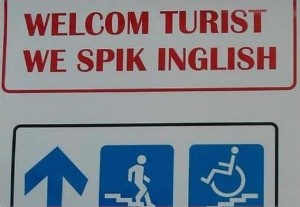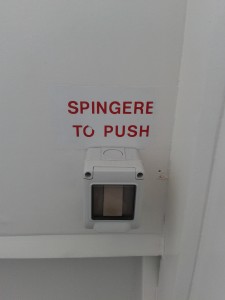We are last in the classification of competency in the language (and we are not much better off with French)
And yet 99% of youth study it at school, obviously with significantly inadequate results
 The fact that the Italian population is not particularly at ease with English (but also perhaps with French) then is not a such a surprising fact; if one has the opportunity to observe, even just a glimpse, the perplexed faces of foreign tourists seen in one of our capitals seeking information, or worse yet for directions, from pedestrians and locals. It is not unusual that they find themselves opposite novices like Totò e Peppino (Italian comedy duo) who reply in the “Noio volevom savuar” (a famous sketch from a comedy film where 2 Italians visiting Milan use ‘French’ thinking they’re speaking German to ask directions from an Italian). And to certify our ignorance, now there is a survey from Eurostat, according to which Italians themselves admit to not exactly being ‘geniuses’ regarding personal linguistic ability.
The fact that the Italian population is not particularly at ease with English (but also perhaps with French) then is not a such a surprising fact; if one has the opportunity to observe, even just a glimpse, the perplexed faces of foreign tourists seen in one of our capitals seeking information, or worse yet for directions, from pedestrians and locals. It is not unusual that they find themselves opposite novices like Totò e Peppino (Italian comedy duo) who reply in the “Noio volevom savuar” (a famous sketch from a comedy film where 2 Italians visiting Milan use ‘French’ thinking they’re speaking German to ask directions from an Italian). And to certify our ignorance, now there is a survey from Eurostat, according to which Italians themselves admit to not exactly being ‘geniuses’ regarding personal linguistic ability.
Surveys from the Statistic Institute of the European Union revealed that in 2011 there was absolutely no one in the entire EU worse than us in English. On a sample of people interviewed between 25 and 64 years of age, only 10% of Italian adults declared having an excellent command of the English language. 26% said they possess a good command and the remaining 64% claims to have barely a sufficient command of the language. France and Germany keep company with us ‘dunces’ with only slightly better statistics.
And if in the case of the French, the aversion to the English language is historically understandable – as well as can be interpreted in the famous refusal of di François Mitterand, former President of the French Republic, to pronounce or even just hearing it pronounced – the Anglo-Saxon origin expression of consent “Okay” – on the other hand, the Germans’ lack of faith of in their linguistic ability is more difficult to interpret. The top of the class were the Maltese (53% claim to have an excellent command of the English language) following is Sweden (43%), then Cyprus (41%) and next Denmark and Holland (both with 36%).
La ricerca è stata promossa in occasione della giornata europea delle lingue e ha analizzato anche lo studio delle lingue straniere nelle scuole primarie e secondarie. In questo caso, i dati italiani sono ancora più sorprendenti. Se in Europa l’inglese è la lingua più studiata, con l’83% dei ragazzi delle superiori che seguono dei corsi, in Italia questa percentuale sale addirittura al 98%. Evidentemente con scarsissimi risultati.

The survey was organized in occasion for the European Day of Languages and also analyzed the study of foreign languages in the primary and secondary schools. In this case, the Italian data is even more surprising. If English is the most studied language in Europe with 83% of high school students who study it, in Italy this percentage even increases to 98% – obviously with significantly inadequate results.
Marco Frisone



![Serbatoi silos contenitori idrogeno verde h2
generate ai serbatoio [foto: imagoeconimica]](https://www.eunews.it/wp-content/uploads/2024/07/Imagoeconomica_1995971-120x86.jpg)


